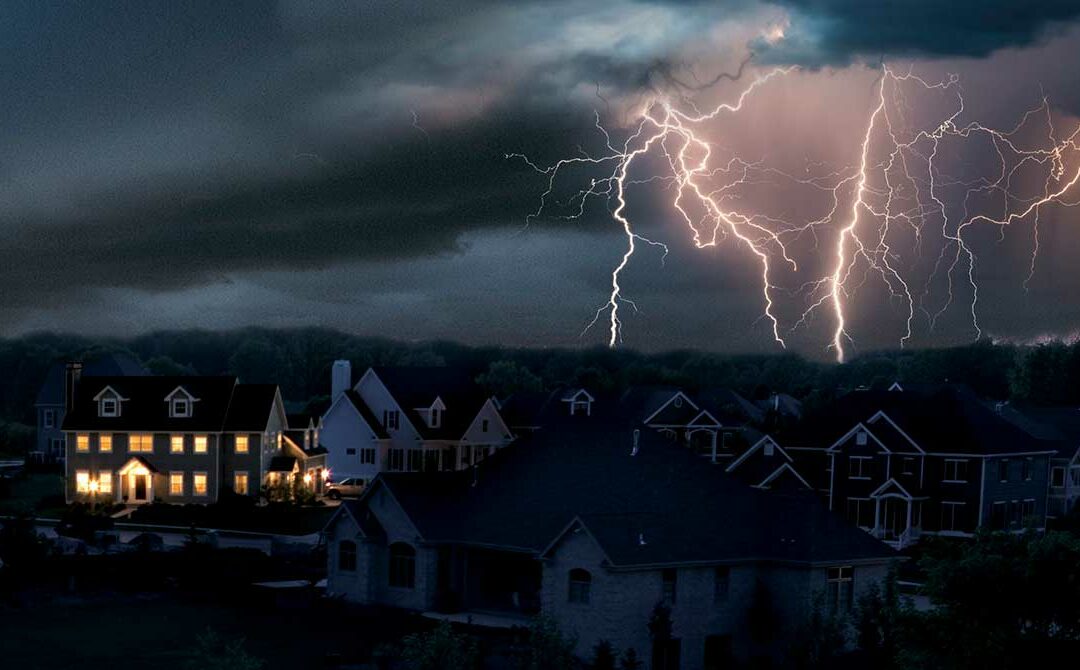One home in this suburburban neighborhood has power after a strong storm knocked out the power. A backup generator is especially useful when the power stays out for hours or days. Power can stay out for days after big storms like hurricanes.
FEMA Recommends a Generator as a Backup Power Source During Emergencies
After Hurricane Irene blasted the East Coast and Caribbean in August 2011, many residents found themselves without power for days and weeks. Damage estimates neared 13.5 billion dollars, one of the costliest hurricanes on record in the United States. Irene made landfall on the USA in Virginia, New Jersey, and New York City, before transitioning to an extratropical cyclone as it reached Vermont.
FEMA, the Federal Emergency Management Agency, issued the following release on November 9, 2011 following the Hurricane Irma disaster.
Release date: November 9, 2011
Release Number: 4021-71
NEPTUNE, N.J. – In the past, enduring a power outage was as simple as starting the fireplace. Not anymore. Fewer and fewer homes have either fireplaces or access to an alternate method of heating and cooking. New Jersey residents affected by the storms of 2011 may want to consider purchasing an emergency generator.
Without electricity, air conditioning and cooking systems may fail, televisions and landline telephones won’t work, basements can flood and security systems can falter. Even those with natural gas heating systems are not immune to concerns. Many of the systems have an electric ignition switch and may have electric blowers to diffuse the heat; without the use of those, the system may be useless.
You don’t realize how much you rely on electricity until it’s gone.
Generators may be purchased as backup systems, for use during emergency outages, and are available locally at home improvement stores or online. Prices and sizes vary. Consult a professional to find the unit best suited to your needs.
Experts from the Federal Emergency Management Agency (FEMA) advise to never run a generator inside a building – not even a garage; the fumes can be deadly. They also recommend hiring a professional electrician to connect the system to your home’s breaker box, a project that typically takes less than two hours.
Tips and other information relating to protecting your property from natural hazards with use of a generator may be found in the online library at www.fema.gov.
FEMA’s mission is to support our citizens and first responders to ensure that as a nation we work together to build, sustain, and improve our capability to prepare for, protect against, respond to, recover from, and mitigate all hazards.
Last Updated:
July 16, 2012 – 18:46
State/Tribal Government or Region: New Jersey
Related Disaster: New Jersey Hurricane Irene

Photo by “Stephen Flanders” Hurricane Irene flood waters scoured away the bridge approach over the Ottauquechee River in Royalton, Vermont.
Backup Generator Emergency Power
As happens with many government documents, FEMA eventually removed the release from their website. Because small generators can only run one or two appliances, it’s usually best to run an extension cord or two. For more than one or two appliances, a direct connection to your home’s electrical system through a transfer switch is the best way to use a generator for backup power during an outage or blackout.
Portable generators connect to the using a generator cord that plugs into an inlet box. The inlet box connects to a manual transfer switch.
In an outage, the homeowner connects the generator, starts it, and turns the generator’s main breaker to the on position. After the generator has a minute or two to warm up, the manual transfer switch is moved from ‘Utility’ to ‘Generator.’ Any circuits supplied by the manual transfer switch have power.
Always follow the manufacturer’s precautions and Portable Generator Safety Rules.
The primary benefit is emergency power at a lower cost. Downsides include limited power, refueling several times a day, fuel storage, and they are not automatic.
An automatic backup generator—usually called a standby generator—runs on natural gas or propane and has a permanent connection to the home or business through an Automatic Transfer Switch. The ATS disconnects the building from the utility before it connects the standby generator. Standby generators range in capacity from 7 kilowatts to 24 kilowatts for air cooled models, and up to 150kW for liquid cooled.
A mid-range capacity air-cooled generator with installation represents a sizable investment, but the benefits could outweigh the cost, including the ability to start and run a central air conditioner.
Automatic operation provides the biggest benefit. They start and run whenever the power goes out, even in the middle of a hurricane. Natural gas provides a virtually unlimited fuel source, and a large propane tank can last a week or longer.

